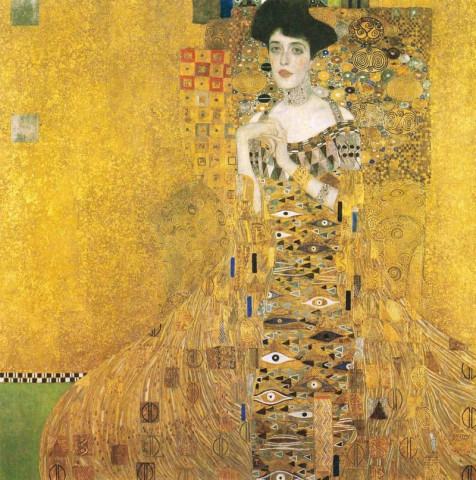
Woman in Gold tells the true story of an octogenarian Jew, Maria Altmann (Helen Mirren), who fled Austria after the Anschluss (union with Germany) to make United States her home for the rest of her life. The story begins in 1998 when Maria reads some old letters that indicate that she is the rightful owner of several priceless works of art, including five paintings by Gustav Klimt. The most famous, and the subject of the title, is a painting of her Aunt Adele Bloch-Bauer, which hangs in Vienna’s venerable Belvedere gallery. In order to claim what she suspects is her property, she needs the services of a lawyer who is an expert in both art restitution and international law. Unfortunately, she has neither the capacity to trust nor the money needed to hire such a lawyer. She settles for the inexperienced and broke Randol Schoenberg (Ryan Reynolds), who is the son of a friend. The two are not particularly eager to work with each other and take turns becoming ferociously driven and firmly resigned during the protracted legal battle that ensues. An unlikely bond eventually forms between the two as they battle dishonest Austrian bureaucrats, sue the Austrian government and litigate their way to the US Supreme Court.
The film tells a powerful story full of nostalgia, villainy, art, legal complexity and moral indignation. Unfortunately, Woman in Gold is written and directed with such heavy-handedness that none of these ingredients are effective in what is, at best, an adequate movie. Nuance is missing in the movie whose stodgy earnestness turns its characters into garish archetypes and its story into a crowd-pleasing drama of good guys versus bad guys.
The bad guys are modern Austrians who are dishonest, unhelpful and simmering with anti-Semitism. They represent pure evil, disinterested in acknowledging, and possibly proud of the sins of the past. Holocaust survivors and their American descendants are the good guys. They are righteous, morally upright and above suspicion. More importantly, viewers are reminded far too often that they are not greedy and disinterested in money. The film has no interest in examining the complex themes of guilt, atonement, justice, artistic provenance, ownership, cruelty and greed.
It would be easy to dismiss Woman in Gold as a mediocre film had it not been for some truly outstanding performances.
Mirren is magnificent in her portrayal of a refined woman, who has learnt to deal with anger and outrage by internalising her pain and hiding her true feelings behind a veneer of dignified hauteur. She approaches her overwritten character with restraint, style and class, elevating banal material with superb acting skills and a clear understanding of the character she wants to play. It is fascinating to see her manage ambivalence, doubt, courage and distress as she develops a firm resolve to reclaim what she believes is rightfully hers.
All other roles in Woman in Gold are woefully underwritten. The film allocates little screen time to some truly wonderful actors, who manage to impress, nonetheless. Jonathan Pryce is masterful in his portrayal of US Supreme Court Chief Justice William Rehnquist in a short yet powerful court scene. Charles Dance plays the head of a law firm with unassuming but effective confidence. Tatiana Maslany plays the role of young Maria in the film’s numerous flashbacks with assuredness, tenderness and subtlety. More remarkably, she manages to show the beginnings of the cool exterior, studied pride and hidden vulnerability that Mirren embodies as the older Maria. Allan Corduner as Maria’s self-respecting father shines in his portrayal of a proud man struggling to handle severe humiliation with dignity. His defiant refusal to give up his weekly practice of the cello, while the Nazis take over Vienna, is one of the film’s most powerful scenes.
The only actor who does not fare well is Reynolds. It takes acting talent and not ill-fitting suits, eyeglasses and crouched shoulders to play the role of an inexperienced but driven lawyer. The hapless young actor does not seem to have the resources to play the role and tenders a particularly bland performance.
Yet, for all its flaws, Woman in Gold tells an important story, one that needs to be told more often. The organised theft of thousands of works of art from entire nations was an unpardonable crime. Such looting and thievery was, however, not limited to the Nazis. The British Empire carried it out more ruthlessly, and more frequently, but mostly managed to escape international condemnation that seems reserved just for Nazis.

Published in The Express Tribune, Sunday Magazine, April 19th, 2015.


















COMMENTS
Comments are moderated and generally will be posted if they are on-topic and not abusive.
For more information, please see our Comments FAQ